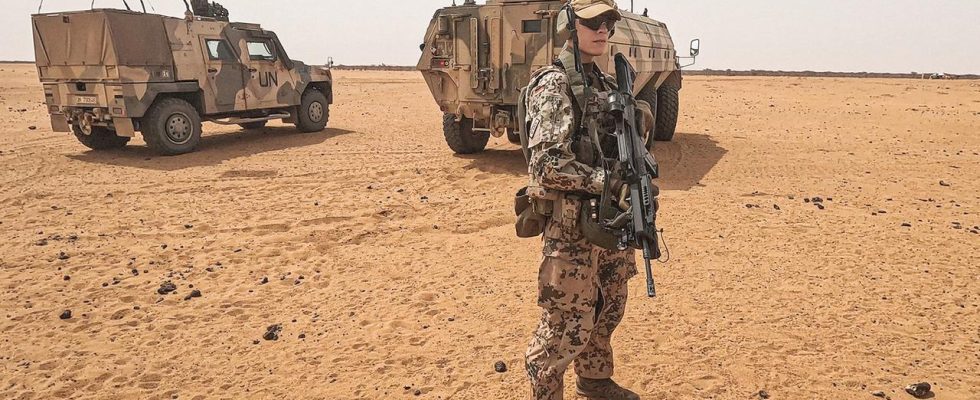The Bundeswehr’s foreign mission in Mali is ending after ten years. Today the last soldiers of the MINUSMA contingent returned to Germany. How do you see their use? By J. Koch and M. Schulze.
There will probably be great relief when Colonel Heiko Bohnsack steps out of the A400M military aircraft in Wunstorf, Lower Saxony, this afternoon. Bohnsack was the last German contingent leader in Mali. After Afghanistan, the West African country was considered the most dangerous location for German soldiers.
When the 54-year-old left for Mali in March, he was “faced with a difficult task,” as he himself said at the time. He is an experienced soldier and has already been deployed abroad four times, in Kosovo and most recently in Afghanistan. But the colonel has never had so much responsibility.
Lots of hard days
In the sheltered Camp Castor, Bohnsack always begins his day with a morning ritual: running shoes, T-shirt, shorts – jogging three laps around the camp. Shortly before 6 a.m. in the morning, the temperatures are still a bearable 30 degrees. He is completely with himself for an hour: “No one can take that away from me. And that actually helps you get through a hard day,” says Bohnsack. The contingent leader has only had a few such private moments in the past few months, but he has had many of these hard days.
Colonel Heiko Bohnsack speaks to soldiers in Gao, Mali.
Use has been controversial for a long time
Bohnsack will initially lead the operation in Mali, West Africa, for six months. Reconnaissance is the task of the Germans there: they monitor large areas of land and ensure security in a state in which several terrorist groups, rebels and Malian armed forces are at war with one another.
Tim M. from Lower Saxony is also among the German soldiers. The 28-year-old got married a few months earlier. In March 2023 he will set off on his first foreign assignment. Tim M. says he became a soldier out of conviction: “We are the life insurance that hopefully no one will ever need.”
He only told his parents about his commitment to the Bundeswehr after he had signed. His father Daniel M. is critical of the UN mission’s mission: “I am of the opinion that we as the Federal Republic of Germany have no place in Mali.” This also applies to his son.
The father is not alone with this attitude. German participation in the UN peacekeeping mission has long been controversial among defense experts and politicians.
Rapid trigger and increased pressure
Criticism continues to mount as the Malian military junta ends the UN mission in June. Since then, Colonel Bohnsack has no longer led an operation, but rather a withdrawal. Thousands of tons of material and hundreds of soldiers must leave the country as quickly as possible.
Bohnsack worked intensively, made contacts and built trust in the Malian authorities. This is good for the withdrawal and at the same time means that the colonel will stay in Mali longer than planned. He doesn’t have much time to stay in touch with his family: “I often feel homesick. I’m a homesick type, but it’s not a bad thing,” he said in the summer. When the colonel returns today, he will have been on duty for almost nine months.
Deployed in Mali for almost nine months: Colonel Heiko Bohnsack.
Soldiers also ask about the meaning
After the UN troops were kicked out of Mali in June, Tim M. and his unit were no longer allowed to leave the camp. The 28-year-old, like many other soldiers, is returning significantly earlier than planned.
For many defense politicians, Mali is not considered a success – quite the opposite. If you ask in Berlin, words like “failed” or “waste of money” come up. But Colonel Bohnsack sees a purpose in the mission: the German soldiers ensured security around the camp, including for the Malian civilian population.
And yet he also says: “You start to think about what will remain of the mission when your own presence ends.” Tim M. also agrees: “What we’re doing there definitely makes sense, but how sustainable is the whole thing?”
Tim M. sits in his living container in the Bundeswehr camp in Gao, Mali.
Political reappraisal should follow
The outcome of the Mali operation also includes losses: three German soldiers were killed. Thirteen were wounded.
Defense Minister Boris Pistorius will receive Bohnsack and the rest of the contingent in Wunstorf, Lower Saxony, in the afternoon. Defense politicians will also be present at the appeal for returnees, as they have already announced that the mission in Mali must be dealt with.
This shows more on the topic Four-part documentary series “Operation Command Mali” in the ARD media library.

